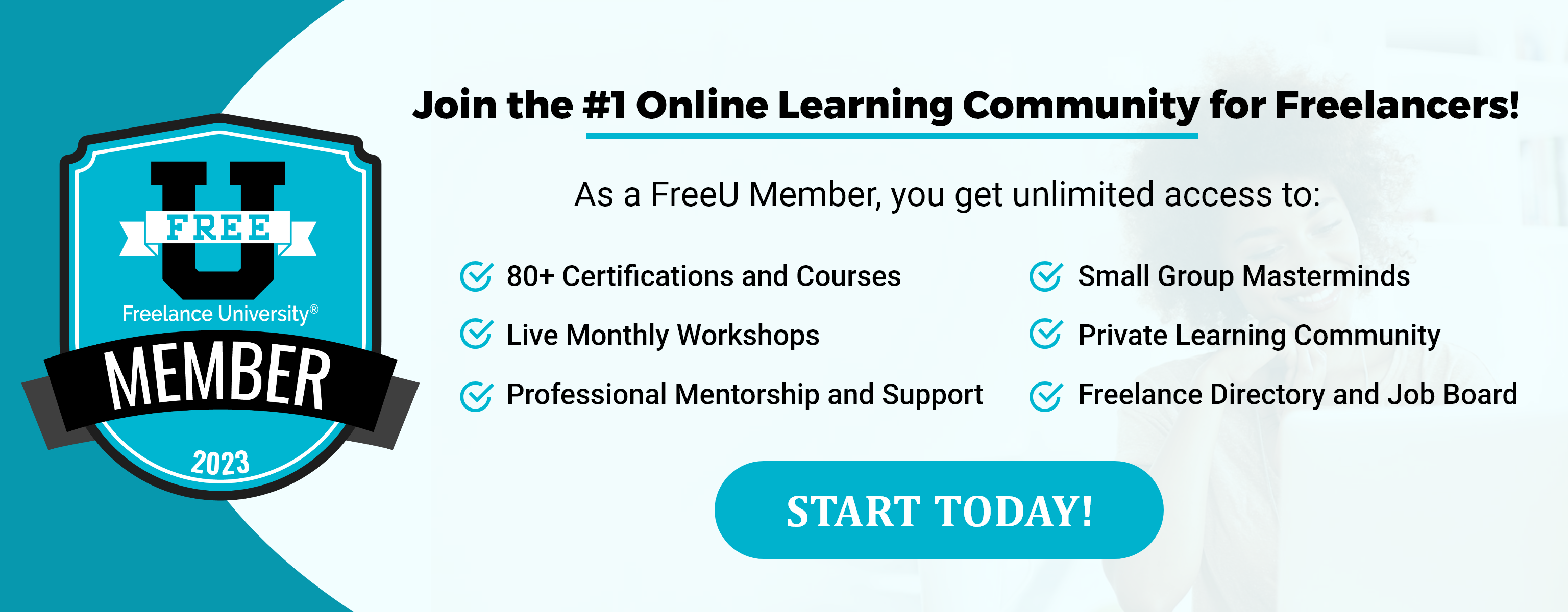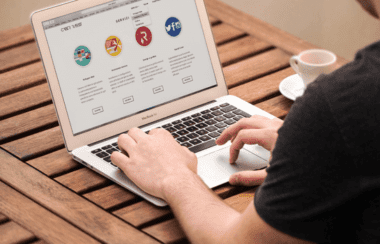How to Freelance with Confidence: Essential Tips for Success
By Craig Cannings

Confident people make confident freelancers. But when you’re just starting out, you might not feel that way because a freelance career seems both exciting and intimidating. In this blog post, we’ll explore how to freelance with confidence by focusing on key strategies that successful freelancers use.
If you feel nervous, remember that you’re not alone. In our 5-Step Freelance Start-Up course, I share the challenges I faced when beginning my entrepreneurial journey. I was risk-averse, resistant to change, and had a lack of self-belief. But, inspired by my wife’s self-confidence and willingness to try new things, I took important steps toward learning how to freelance with confidence.
First off, it’s essential to recognize your strengths and weaknesses so you can identify your unique service offerings. Next, creating a professional brand will help you stand out from the competition while showcasing your expertise. Networking with other professionals not only provides valuable connections but also helps bolster your credibility within the industry.
Furthermore, charging what you’re worth encourages you to understand your value and manage your time so you can avoid burnout as you navigate the freelance lifestyle. Lastly, investing in yourself through continuous learning and skill development demonstrates commitment to excellence so you’ll attract ideal clients.
Join us as we delve into these essential steps for mastering how to freelance with confidence so you can be successful in today’s competitive market. Now that my confidence has grown, I love the freelance lifestyle and would never look back. I’m confident you’ll love it too!
Table of Contents: How to Freelance with Confidence
How to Freelance with Confidence: Five Strategies
1. Understand Your Strengths and Weaknesses.
2. Develop a Professional Brand.
3. Network with Other Professionals.
How to Freelance with Confidence: Five Strategies
1. Understand Your Strengths and Weaknesses.
Identifying your strengths and weaknesses is essential for freelancing with confidence. By identifying what you excel at, as well as areas where you may need improvement, you can focus on providing high-quality services that showcase your unique skills.
Assess Your Skills
To start, make a list of all the skills you possess related to your freelance work or industry. This could include technical abilities like WordPress maintenance or podcast editing, soft skills such as communication and time management, or specific expertise in a particular niche. Also remember to list any online or offline training you’ve done in courses, seminars, or conferences.
In a previous blog post titled “How to Combat Imposter Syndrome in Your Freelance Business,” we recommend doing an inventory of the skills and abilities you’ve learned in the past year. At Freelance University (FreeU), each digital certification includes a badge you can display on your website and social media. It’s a visual reminder that builds confidence in both you and your clients.
Identify Areas for Improvement
Next, consider any gaps in your skill set that might hinder your success as a freelancer. For example, if you’re a skilled writer but struggle with marketing yourself online, this would be an area worth addressing.
– Seek Feedback from Peers and Clients: An effective way to identify areas for improvement is by seeking feedback from peers and clients who have worked with you before. They can provide valuable insights into how well they think you perform certain tasks compared to others in the same niche.
– Use Online Skill Assessment Tools: You can also use online skill assessment tools designed specifically for freelancers to help gauge where improvements are needed within various aspects of running a successful business — including project management skills or financial planning knowledge.
As we discuss in our previous post, “How to Handle Failure and Success in Your Business,” figuring out what type of training or mentorship you need gives you the courage to continue in your business. And with that courage comes confidence.
Focus on What You Do Best and Outsource the Rest
– Leverage Your Strengths: Once aware of both strengths and weaknesses, prioritize projects that match your strengths. Either seek additional training training for areas of weakness or say no to tasks that fall too far outside your skill set.
– Outsource: For tasks that fall outside your area of expertise, consider outsourcing them to other freelancers. Emphasizing your abilities and leveraging them to the fullest extent will help you reach success in your freelance career, while also ensuring that customers receive only top-notch results.
Constructing a solid base for your freelance business and reassuring yourself, as well as clients, of the worth you can offer to their businesses will help you serve clients with excellence. And creating a referral network with fellow freelancers benefits both their business and yours.
Develop a Confidence Mindset
At Freelance University, we define mindset as “a set of beliefs or a way of thinking that determines one’s behaviour, outlook and mental attitude.”
Christine Kane explains this further in an article titled “Quit Your Job to Start a Business? 6 Must-Do Mindset Shifts.” Specifically, she describes the type of shift that freelancers need to make:
“The true test of entrepreneurial success is your mindset. With freedom comes responsibility. So when you leave your job, you need to make internal changes.”
In particular, the right mindset for successful freelancing involves adaptability, resilience, self-discipline, and an entrepreneurial spirit. Embrace challenges as opportunities for growth and maintain a positive attitude toward learning from mistakes. If you find you’re lacking some important traits or skills, stay positive and look forward to growing in your areas of weakness instead of getting down on yourself.
Most importantly, to build confidence, treat yourself like a business owner rather than an employee. You are your own boss, and you’re free to make your own decisions without being told what to do.
Understanding your strengths and weaknesses is the first step in knowing how to freelance with confidence so you can build a profitable business. As we said above, confident people make confident freelancers. Develop a long-term vision, take action, and be confident enough to lead others.
Next, developing a professional brand will help you stand out from the competition and attract potential clients.
2. Develop a Professional Brand.
Creating a professional image is essential for freelancers wishing to stand out from the rest and draw in ideal clients. Your brand should reflect your unique skill set, personality, and values while also showcasing your expertise in your chosen niche. Here are some steps you can take to develop an impressive professional brand:
Define Your Unique Selling Proposition (USP)
Your USP is what sets you apart from other freelancers offering similar services. To define yours, consider what makes you different or better than others in your industry — it could be anything from specialized skills to exceptional customer service.
Create a Consistent Visual Identity
A strong visual identity helps create recognition and trust among potential clients. This includes elements like colors, fonts, logo design, and overall style that should remain consistent across all platforms such as LinkedIn, personal website/portfolio site, business cards, etc.
– Colors: Choose two or three primary colors that represent your brand’s personality.
– Fonts: Select one or two legible fonts that complement each other well.
– Logo Design: Create a simple yet memorable logo that represents your services effectively.
Build an Online Presence
An online presence allows potential clients to find you easily when they’re searching for freelance services within their niche market segment(s). Start by creating a professional website with examples of previous work or specific projects. Include client testimonials if available; this will help you build confidence and establish credibility right away.
In addition,
– Create profiles on relevant social media platforms like LinkedIn, Instagram, Facebook, and Twitter.
– Join online communities and forums related to your industry, such as the Freelancers Union or the FreeU Facebook Group.
– Regularly share valuable content (blog posts, articles, etc.) that showcases your expertise in your field.
Communicate Your Brand Values
Your brand values should be an integral part of every interaction you have with existing clients or potential clients. Clearly communicate these values through both written and verbal communication channels like emails, proposals, phone calls, etc., so they know what to expect when working with you.
Incorporating these steps into your freelance business will help develop a professional brand that sets you apart from other freelancers while also attracting high-quality clients who value the unique services you offer.
So, as you can see, crafting a professional brand is an important step in learning how to freelance with confidence. Now, as you start networking with other professionals, you can leverage their experience and contacts in order to expand your business opportunities.
3. Network with Other Professionals.
Connecting with other professionals in your niche is a further strategy that shows you how to freelance with confidence. First of all, it enhances your recognition and trustworthiness as a freelancer.
Networking allows you to learn from confident people, share ideas, and collaborate on projects. It also helps you stay up to date on industry trends and provides opportunities to find new clients or referrals.
Attend Industry Events
Attending industry events, such as conferences, workshops, seminars, or webinars related to your niche, is a great way to network and forge meaningful connections with like-minded professionals. These events allow you to meet people who can offer valuable insights into the freelance world while providing an opportunity for face-to-face interactions that can lead to lasting professional connections.
Join Online Communities
Connecting with other freelancers is now made easy through the variety of online communities available in the virtual world. Platforms like LinkedIn Groups, Reddit forums, and specialized Facebook groups provide spaces for professionals in various industries to discuss topics related to their work experiences and challenges they face as freelancers.
For example, our FreeU Facebook Group is a warm, inviting community where mentors and FreeU students ask questions, share their challenges, and celebrate their successes.
– Tip: When joining these online communities, be sure to not only participate but also contribute value by sharing helpful resources or offering advice based on your expertise. This will help you feel confident as you help others succeed in their freelance careers.
Collaborate on Projects
An excellent way of networking is through collaboration on projects with other freelancers or businesses within your niche. This not only expands your portfolio but also demonstrates teamwork skills that potential clients may appreciate when hiring a freelancer. Reach out to fellow freelancers or businesses with complementary skills and propose a joint project that benefits both of you.
Build Your Personal Network
Don’t neglect the influence of your personal contacts when networking as a freelancer. Friends, family members, former colleagues, and acquaintances can all be valuable connections in helping you find new clients or projects. Make sure they are aware of your freelance services by sharing updates on social media platforms like Facebook, Twitter, and LinkedIn.
In a previous FreeU podcast episode, “The Never Freelance Alone Class,” we list four circles of support that are required to build a healthy community for your business:
– Your business champion
– Supportive family and friends
– A coach or mentor
– A community of peers.
This support network will help you enjoy a long-term, enduring business, while at the same time reminding you how to freelance with confidence.
To sum up, networking is an essential aspect of building confidence as a freelancer. By connecting with other professionals in your field through industry events, online communities, collaborations on projects, and your personal network, you’ll increase visibility while gaining credibility within the freelance community.
Now let’s discuss how charging what you’re worth is a must for building your confidence and safeguarding your time and energy.
4. Charge What You’re Worth.
As a freelancer, it’s essential to avoid undervaluing your services. Establishing boundaries regarding time and money will help you feel confident in your freelance career, while at the same time granting you the power to regulate your workload and avoid feeling overwhelmed.
Create a Work Schedule
One of the first steps in understanding your worth is creating a work schedule that supports your freelance lifestyle. Specify when you can be contacted for work and let your customers know this information.
Time is valuable, so by having set working hours, you’ll create consistency in both your personal life and professional relationships. After all, if you allow some clients to dictate your schedule, you might miss out on opportunities to earn income from other clients.
To value your time, create boundaries like this:
– Decide on specific days and times when you’re available for client meetings or calls.
– Schedule regular breaks throughout the day to prevent burnout.
– Establish “off-limits” times when you won’t respond to emails or messages (such as evenings or weekends).
Determine Your Rates
To feel confident, an essential boundary you need to establish is your pricing structure. Research industry standards, consider factors such as experience level, location, skill set, etc., then determine an appropriate rate for each service offered by using resources like the Freelance University courses.
For example, in the Pricing Your Freelance Services course, we discuss four pricing models: hourly, project, fixed (retainer), or value-based. Each one has pros and cons, so you can choose the one that works best for you and your clients.
Here are some other recommendations when determining your rates:
– Create tiered pricing packages based on different levels of service offerings.
– Avoid undercharging; know your worth.
– Be prepared to negotiate but always have a minimum rate you won’t go below.
And remember this encouragement from our blog post titled “How to Raise Your Rates the Right Way“:
“Maybe others have said we’re not good enough. Or we experience imposter syndrome. Negative thought patterns make us doubt our abilities.
“But rest assured, you are more talented than you think. Remind yourself of that, because if you don’t believe in yourself, you’ll never charge what you’re worth.”
Define Your Scope of Services
Ensure that you are clear about the services included in your freelance offerings and any additional charges for extra work or revisions to avoid misunderstandings between you and your clients. This clarity will help build trust while also preventing future conflicts.
– Create a list of services offered, including detailed descriptions for each task.
– Establish policies regarding revisions, turnaround times, and cancellations.
– Communicate these boundaries clearly in contracts or proposals before starting any project.
Incorporating these strategies into your freelance business not only helps you charge what you’re worth but also strongly illustrates how to freelance with confidence. Remember that setting limits is essential for maintaining control over your workload and ensuring long-term success in the world of freelancing.
Finally, investing in yourself is a key strategy that helps you gain (and maintain) confidence as a freelancer.
5. Invest in Yourself.
Investing in yourself helps you remain competitive so you can feel confident as a freelancer in the perpetually changing landscape of remote work. By continuously honing your skills, you’ll not only become more proficient at what you do but also gain an edge over other freelancers who may not be as proactive about their professional development.
Take Online Courses
One approach to personal development is taking online classes related to your niche or interests. Websites like Coursera, Udemy, and Skillshare offer thousands of classes on various topics, from web design to marketing strategies. These platforms often provide free or affordable options, making it easy for freelancers to learn new skills without breaking the bank.
At Freelance University, we offer more than 80 courses related to specific training tracks and update them regularly so your skills can keep pace with rapid changes happening in the freelance industry. We recommend trying a wide variety of courses so you can broaden your perspective and figure out what you enjoy doing most.
Attend Workshops and Conferences
Attending workshops and conferences can be an invaluable way to stay up to date on industry developments, expand your professional network, and even access virtual events from anywhere in the world. Many events have transitioned into virtual or hybrid formats because of the pandemic, allowing attendees from all around the globe access without having to travel physically.
Join Professional Communities
Becoming a member of professional communities related to your niche can be incredibly beneficial when investing in yourself as a freelancer, especially if they offer resources such as webinars or mentorship programs specifically tailored toward freelance professionals’ needs.
For example, if you’re part of Freelance University’s community (as mentioned earlier), make sure you take advantage of our full suite of resources designed for freelancers. We’ll help you learn how to freelance with confidence, in addition to many other skills.
Set Aside Time for Personal Development
Lastly, it’s essential to set aside time in your schedule specifically dedicated to personal development. This can include reading industry-related articles, listening to podcasts, or even practicing mindfulness techniques that help improve focus and productivity. By consistently making an effort toward self-improvement, you’ll not only boost your confidence as a freelancer but also enhance the quality of work you deliver to clients.
In our previous blog post, “Five Ways to Think Like a Boss,” we recommend embracing continuous learning instead of waiting for clients to tell you what you need to learn. Thinking like a boss makes you self-motivated and proactive, another way you can show everyone that you know how to freelance with confidence.
Remember: investing in yourself is an investment in your freelance career’s success and longevity, so don’t hesitate to prioritize professional growth whenever possible.
Now You Know How to Freelance with Confidence!
I often tell our FreeU students, “You are better than you think.” And I’m telling you this now.
I know that venturing into freelancing can be intimidating, but with the correct mindset and strategies, it also brings great benefits. By understanding your strengths and weaknesses, developing a professional brand, networking with other professionals, charging what you’re worth, and investing in yourself, you’ll know how to freelance with confidence.
So, never feel like an imposter. Build confidence by reminding yourself that you belong here, and enjoy the adventure!
At FreelanceU, we provide a wide range of resources to help you maximize your potential as a freelancer — from courses on how to market yourself effectively as a freelancer to tips on managing your time more efficiently and growing your business — we’ve got everything you need to thrive in today’s competitive marketplace.
Ready to start freelancing with confidence? Check out Freelance University Today!









































































































